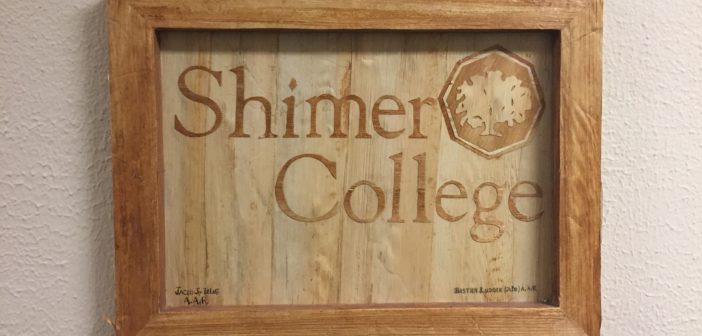At the beginning of the 2017-18 school year, North Central acquired the Shimer Great Books School. As winter term starts up, two Shimer students and a professor reflect on their time at NCC so far.
Shimer College offers students a non-conventional college experience. Rather than sitting through lectures, reading textbooks and taking notes, Shimer courses follow the Socratic method. This can be described as a “form of cooperative argumentative dialogue between individuals, based on asking and answering questions to stimulate critical thinking and to draw ideas and underlying presumptions.”
“The center of attention is not the professor – the text or artwork or experiment we are studying on that day is the focus of an open-ended intellectual exploration,” said Adam Kotsko, visiting assistant professor in the Shimer Great Books School.
Because of the different approaches to education, however, the transition to a traditional college has been a challenge for some Shimer students. Students like Darcae Holmes and Tyler Dixon are taking courses through both colleges, and the difference is apparent.
“I am taking two classes outside of the Shimer curriculum and I can definitely say that they are taught completely different from what I’m used to at Shimer,” Dixon said.
“The transition has been a process,” Holmes said. “Adjusting from a small, intimate setting to a large one brought upon a huge atmosphere change.”
That change in atmosphere includes the conversion of the Seybert residence hall to a space for Shimer students and faculty, as well as sticking to their traditional classroom format of chairs surrounding a discussion table. Shimer students have found their place on campus, but that does not necessarily mean they are at home just yet.
Dixon, a social science major and political science minor, feels “welcomed at NCC, [but]it doesn’t feel like home.” He went on to say, “but that’s probably just because I’m a senior and I’ve spent most of my college career in Chicago.”
When asked whether or not he thinks that two colleges have combined, he said: “Given that this is the first semester that Shimer has been a part of NCC, it doesn’t really feel like the two schools have blended, it feels like the two colleges are simply co-located.”
Kotsko feels the transition has been an improvement. “The campus is beautiful, all of the facilities are of higher quality and better maintained, and at least for me, the commute is similar,” he said. “It’s really the best of both worlds – we get to keep what is best about Shimer while gaining access to more resources and, more important, being part of a bigger intellectual community.”
“Everyone at NCC has been very welcoming to us – faculty, administrative staff and students. I have made friends with a number of new faculty colleagues, and the Shimer program has already formed good relationships with other closely related programs,” Kotsko went on to say.
He has not yet taught students outside of the North Central program, but he “[looks]forward to doing so in an IDS course on “Deals with the Devil” this spring.”
NCC students cannot yet enroll in Shimer courses, but Dixon explains that it is hard to get an inside perspective from the outside. “The school is incredibly small so everyone knows each other and it really does feel like a family,” he said. “Speaking for myself, there’s an unwavering respect I have for everyone that’s a part of this family, even it we don’t always see eye to eye.”
Though it is not yet an option, Dixon says, “If you really want to get a feel for Shimer, take a class. It’s truly a unique experience.”

